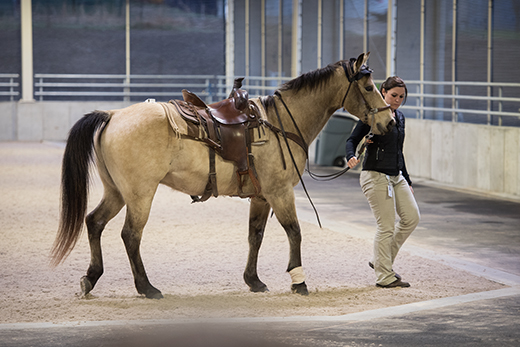Regenerative medicine therapy now available for horses at Veterinary Health Center
Thursday, July 19, 2018

Regenerative medicine therapy for horses has been added to the services offered by Kansas State University's Veterinary Health Center. | Download this photo.
MANHATTAN — The Veterinary Health Center at Kansas State University is now offering regenerative medicine therapy, including platelet-rich plasma and animal stem cell therapies, for equine patients.
Just like in humans, animal stem cells are the precursors of normal tissue cells and can be found throughout the animal's body, often enriched in the bone marrow and fat. Studies to date have shown that animal stem cell therapy is safe and has the potential to be effective in the treatment of multiple, acute and chronic inflammatory diseases. Platelet-rich plasma uses the effects of concentrated growth factors, released from the platelets, to enhance the healing process.
The Veterinary Health Center is working with Enso Discoveries, a regenerative medicine company based in Manhattan. Enso's protocols were developed in collaboration with Chanran Ganta, a stem cell researcher and veterinary pathologist at the Kansas State Veterinary Diagnostic Laboratory.
"It is imperative to ensure that the stem cells collected from patients are viable, sterile, present in numbers shown to be clinically effective, and are safe for use in patients," Ganta said.
Stem cells collected from patients at the Veterinary Health Center can be processed at Enso's Manhattan laboratory and used in a patient within the same day.
Dylan Lutter, a clinical assistant professor and equine surgeon at the Veterinary Health Center, said that equine patients with osteoarthritis, tendon injuries and ligament tears may benefit from animal stem cell therapy. Lutter cautions, though, that while initial studies are promising, stem cell therapy must be performed correctly and applied appropriately.
"While early studies using stem cell therapies in horses have shown a beneficial effect in a number of conditions, it is important to remember that these treatments are still experimental and there are many variables in play that could affect the clinical outcome of any individual patient," Lutter said. "Validated scientific protocols and sound clinical decision-making must be used in all cases in order to minimize the variables associated with the actual stem cells used in each patient."
Lutter and Ganta will soon be starting a project to study the effects of a novel, platelet-product and animal stem cells on wound healing in horses. The project will use a bedside kit developed by Enso to produce platelet-rich product from the patient's blood. The platelet-rich product can then be applied directly into a wound to help stimulate healing of recent or even old, nonhealing wounds. Lutter and other surgeons at the Veterinary Health Center already used a similar kit produced by Enso to generate platelet-rich plasma, which has well established healing properties when used to treat soft tissue injuries such as strains and sprains.
"The list of possible uses for stem cell and other regenerative therapies is long and we are pleased to be able to offer this treatment to patients and clients," Lutter said. "In fact, other studies at the College of Veterinary Medicine are ongoing, including a pilot study assessing the use of animal stem cell therapy in cats with chronic kidney disease."
The project is in its final phase of completion, but it is still too early to determine whether animal stem cell therapy can slow the progression of kidney failure in these patients. Additionally, the Veterinary Health Center hopes to offer treatments to cats with a debilitating oral disease called lymphocytic and plasmacytic stomatitis. This painful disease can be resistant to traditional therapies in some cats. Early studies from the University of California, Davis indicate that cats respond favorably to animal stem cell therapy.
The Veterinary Health Center at Kansas State University is a full-service veterinary hospital providing routine, specialty and emergency care. Our mission is to provide superior veterinary medical education, quality patient care and exceptional customer service in a caring environment. Questions can also be referred to the center at 785-532-5690.
